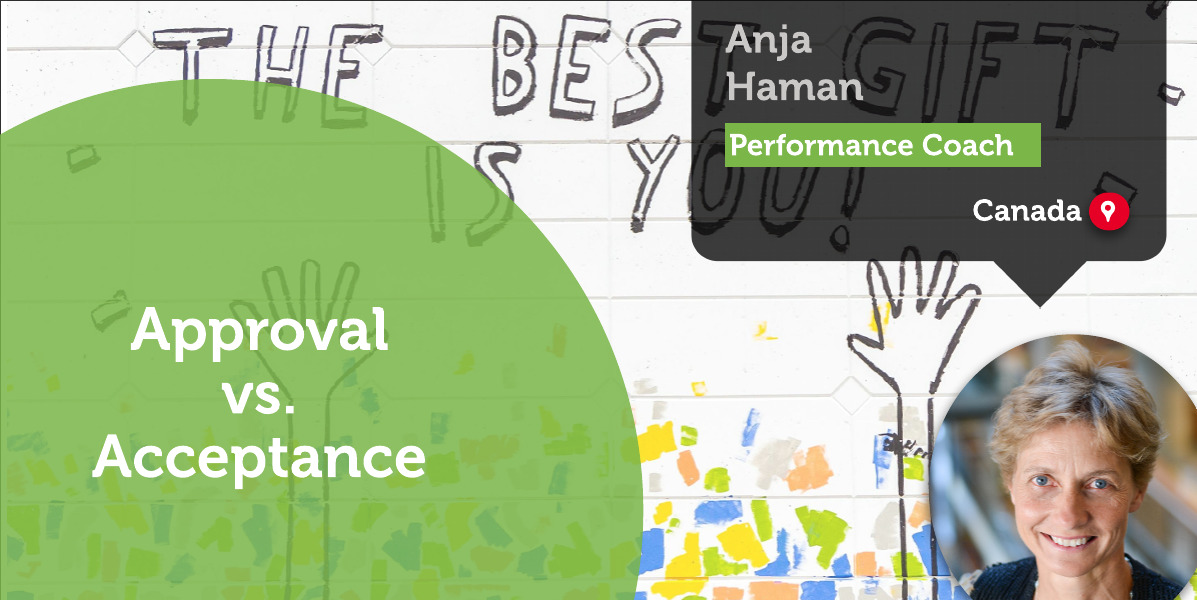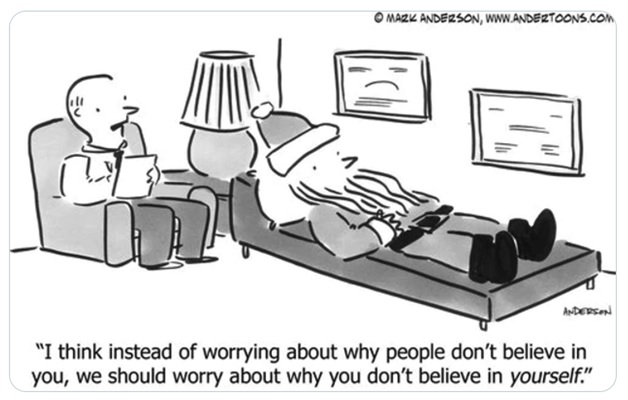A Coaching Power Tool By Anja Haman, Performance Coach, CANADA

The Difference Between Approval vs. Acceptance

Most societies create cultural norms that form expectations of individuals in society. In part, this helps the community function. Without boundaries and guidelines, unmanaged conflicts and unclear social order can result. Expectations of behavior are created for the good of the whole. However, these norms can also affect individuals negatively by creating expectations they do not want to fulfill or find very challenging to fulfill. Human beings are social, and we are programmed to find safety within groups. When the pressure to conform creates an unhealthy need for approval from others, people seek their confidence and direction externally, where they have little control. This results in long-term insecurity.
On the other hand, self-acceptance leaves the individual to accept themselves as worthy while acknowledging strengths, weaknesses, successes, and mistakes. Other people’s expectations are considerations in keeping the community functioning and improving, however, one’s self-worth is not reliant on their approval. A culture of acceptance and diversity reinforces this individual self-acceptance, but it can be developed in the individual without a supporting culture. Many notable leaders demonstrated self-acceptance by questioning existing norms and believing in their right to do so. Dr. Marie Curie, Gandhi, Martin Luther King, Katalin Kariko and so many more broke new ground by believing in their inner compass and self-worth.
Seeking approval externally can lead to fear, anxiety, and shame as expectations and powers shift, and the world changes. Accepting oneself opens the doors to curiosity, empathy, and growth because new expectations and norms can be questioned and assessed without posing a personal threat. Transitioning from seeking approval to self-acceptance frees people to live authentically and be their best selves.
Approval vs. Acceptance Symptoms and Beliefs
Approval
When we seek approval from others we are finding confidence externally. Our confidence can become dependent on our environment and circumstance and is not secure over time.
Typical symptoms of seeking confidence through other people’s approval:
- Flip-flopping a viewpoint based on the approval of those in the room
- Inconsistent confidence that is shaken by the failure
- Being overly focused on performance results
- Working harder than necessary and never feeling performance is enough
- Using comparisons to others as a way of valuing oneself
- High need for external validation and visibility of results
- Potential feelings of inadequacy, shame, embarrassment, disappointment, fear, anger, doubting, and fragility.
Underlying beliefs that support the need for external approval include:
- If I achieve “x” I will prove my worth. This leads to a constant cycle of setting and achieving goals and chasing a sense of worth.
- I need to be successful to prove my value
- I need to execute perfectly to be acknowledged for my work
- I must be visibly successful to “have made it”
- My friends and acquaintances define my success through their stature
- I am not worthy as is
Acceptance
When we accept ourselves as “good enough” we are more willing to take on challenges, try new things and weather the ups and downs of life. We value people with skills better than our own and see failures as a normal part of pushing ourselves forward. We adopt a mindset where we are continually growing and learning individuals.
Acceptance can be demonstrated as follows:
- A willingness to change viewpoints based on new facts
- Ebbs and flows of momentum are seen as a normal part of productivity
- Process and performance are valued
- Continual learning and failures are seen as a natural state of challenging oneself
- Empathy for others is natural because they are deemed as worthy and not seen as competitors
- The ability to “work with” versus “compete with”
- Acting on an inner compass by letting values and purpose influence behaviors
- Potential inner feelings of freedom, curiosity, power, gratefulness, peacefulness, and joy.
Beliefs that underlie self-acceptance:
- My failings are part of common humanity – they are normal
- I am always learning and growing, and ebbs and flows are a normal part of that
- I follow my inner compass – my values and purpose – and it guides my actions
- My friends and acquaintances are based on mutual respect and can come from all walks of life
- I am always ready, always resourceful
- There is no point in time when my worth is proven. I am worthy as I am now
- I enjoy growing myself and taking on challenges – not as ways to evaluate myself but as ways to experience life
Reframing
The Key to Moving From Seeking External Approval to Self-Acceptance
It begins with awareness: what do you tell yourself? What do others tell you? What are your underlying beliefs and assumptions around life events and your role in them?
With awareness, we can choose to try on other perspectives, and reframe our position as it serves us. Some common areas for exploration:
Self-talk: what am I telling myself? Does it serve me and is it true? What positive statements can I replace the negative ones with? Do I tell myself more positive than negative statements? What would that feel like?
How life events are explained: when I explain life events how do I frame them? Can I view the same event from different perspectives, and then reframe my perspective to better serve me? Some common styles that don’t serve well:
- Maximizing negatives and minimizing positives
- Overgeneralizing when explaining a negative event (does not passing an exam mean I can’t learn or was this just one exam?)
- Overly negative style of explaining events (what positive came from this event?)
- Emotional reasoning (trusting the emotion without questioning its validity)
Understand the underlying beliefs: what is the belief behind my need for approval, and is this still valid and valuable? What would it take to accept me as is? If I am seeking approval, when will the seeking end?
Some beliefs I might question:
- Seeing myself as either good or bad, competent or not (instead of as a natural part of humanity, with strengths and flaws that are dynamic over time)
- Needing perfection to be worthy of love or respect
- Needing success to prove worthiness
- Needing to achieve, or be perfect, to protect or support others
Self-compassion: in a world that comes with many judgments and pressures, compassion for oneself is often left behind, yet it’s one of the key ingredients in developing resilience. Self-compassion includes providing oneself with physical and emotional care, creating awareness of our physical and emotional pain, and allowing ourselves to be as fallible as a common humanity.
Creating Support
Developing self-acceptance and building the resilience that comes with it is a journey that takes time. Shedding patterns of judgment and doubt about acceptance and self-worth requires consistent and incremental change. To stay the course during the ebbs and flows of this journey, two support structures have been shown to be invaluable:
An Inner Compass: people with a strong inner compass are more likely to be resilient in the face of adversity. Defining one’s purpose and values and aligning behaviors to them will provide firm footing to weather challenges.
Social Support: Since human beings are programmed for seeking social acceptance, it is important to nurture meaningful social relationships to provide a safe place through challenges and stressors. A small group of people who can be relied on for support is key for developing self-acceptance.
Coaches can support their clients on the journey from seeking external approval to self-acceptance by creating awareness around existing beliefs and working with them to incrementally change habits of thinking, feeling, and interpreting. Supplementing this work with a strong social support network and an inner compass to rely on will help create a strong base to rely on.
References
Sheryl Sandberg & Adam Grant. The importance of resilience with Sheryl Sandberg and Adam Grant, Retrieved March 2022
Shelley H. Carson and Ellen J. Langer. June 2006. Mindfulness and Self-acceptance. Journal of Rational-Emotive & Cognitive-Behavior Therapy, Vol. 24, No. 1
Pam Alfrey Fernandez. The right reflection: improving women’s self-acceptance, University of Pennsylvania, Masters of Positive Psychology, MAPP Capstone projects, 56.
Jean Whitlock, Trinh Mai, Megan Call, & Jake Van Epps (Feb 2021) How to practice self-compassion for resilience and well-being. University of Utah Resiliency Center. Retrieved March 2022
Center for Creative Leadership website (CCL 2022). The power of positive self-talk when leading to uncertainty. Coaching for Workplace Resilience Retrieved April 2022
Carmelina Lawton Smith, (2017, March). Coaching for leadership resilience: An integrated approach, International Coaching Psychology Review, Vol. 12 No. 1, pg 4-21